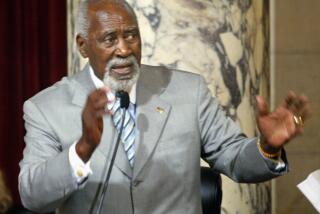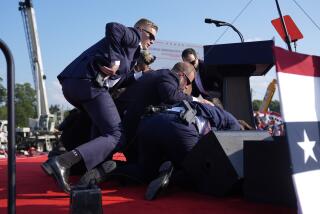Clinton Friend Defends Role in Travel Flap
WASHINGTON — As the Administration struggled to get out from under the burgeoning White House travel office controversy, Harry Thomason, television producer and longtime friend of President Clinton, defended his involvement in the affair Saturday, saying, “I feel dumb,” but insisting that he had acted with good intentions.
Clinton flew to New Hampshire Saturday morning to deliver a commencement address in which he focused on his economic plan, appealing for support. But White House reporters focused, instead, on the travel affair, bombarding Press Secretary Dee Dee Myers with questions about Thomason.
At issue was whether Thomason improperly used his friendship with the President in an attempt to obtain business for companies run by his friends.
In a lengthy interview here with The Times, Thomason denied the accusation. He acknowledged that a business partner, Darnell Martens, had contacted White House travel office director Billy R. Dale in February to find out how nine airline charter companies that had supplied planes for the Clinton campaign could bid for the business of ferrying White House reporters on presidential trips--the chief role of the office.
Thomason insisted that his own business venture with Martens--a service company that handles paperwork for airlines--would not have gained financially had the charter companies gotten the business. But he acknowledged that the company could have gained “goodwill” through helping others bid for the work.
Instead, however, Dale rebuffed Martens, telling him, according to a memo Martens wrote at the time, that his office was not interested in doing business with outsiders.
Dale and his six employees in the travel office were fired Wednesday. The FBI has begun an investigation into possible criminal wrongdoing in the operation of the travel office, and the no-bid arrangements under which charter business was awarded is one area the bureau will explore.
But while the White House has tried to draw attention to the conduct of Dale and his former colleagues, Thomason’s involvement has instead shifted the focus to the accusation of cronyism on the part of Clinton’s aides.
“I feel badly that my involvement has given them another day of this,” Thomason said.
The new allegation comes after several weeks in which some White House political advisers have used Thomason as a symbol of what they complain is excessive entanglement between Clinton and Hollywood celebrities.
That line of criticism began earlier this spring after the President was photographed repeatedly with a succession of movie stars, from Paul Newman to Barbra Streisand and Sharon Stone. The volume of complaints rose this week after Clinton apparently tied up commuter air traffic at Los Angeles International Airport while Beverly Hills stylist Christophe gave him a haircut aboard Air Force One.
The Hollywood connection clearly poses a potential political problem for the President, Thomason said, although he deemed the criticism unfair.
“I get it,” he said, adding: “I resent everyone in Hollywood being stereotyped into one mold. . . . Hollywood is a very diverse community.”
But the questions about Thomason’s involvement in the charter business have, for now, overshadowed even the Hollywood issue.
Last year, the company in which Thomason and Martens are partners--Thomason, Richland & Martens Inc.--coordinated the activities of the various companies supplying planes to the Clinton campaign. After the election, Martens contacted Thomason and White House Press Secretary Myers to discuss possible further business relationships.
“He asked me, ‘Do we want to do business with them?’ ” Thomason recalled. “I said: ‘No, I don’t think we should fool with that.’ ” But, he said, he did tell Martens that he saw no reason why Martens could not contact the White House on behalf of other companies in which Thomason had no financial interest--as long as the companies were seeking only to obtain business through competitive bidding.
When Martens contacted Dale, Thomason said, he received a sharp rebuff.
Dale has denied any wrongdoing in his role as director of the travel office.
Dale’s office had contracted for many years with Pan Am to handle White House press charters. After Pan Am closed last year, Dale moved the business to two related companies started by former Pan Am executives--Airline of the Americas and UltraAir--selecting them without competitive bids after saying no other charter companies were interested.
White House officials contend that the arrangement may have cost news organizations thousands of dollars in unnecessary charges. But they concede they cannot be sure, in part because Dale’s office kept limited records.
Although Thomason insists that Martens was only seeking information about how other companies could bid, Martens’ memo implies that he, at least, envisioned a broader role for TRM--one in which the company could take over some of the work being done by Dale and his colleagues in arranging charters.
According to Martens’ memo, Dale told him: “I have been here 31 years, and no one has seen fit to replace me with a commercial operation yet. So until they do, I will continue to handle this without your help.”
In any case, Dale’s reaction “ticked me off,” Thomason said. “The idea of a government bureaucrat refusing to even consider doing business with someone.” Shortly thereafter “I mentioned it to the President. I told him: ‘You know, I think you’ve got a problem. But I’m not going to bore you with all the details of it.’ ”
Instead, Thomason said, he told White House administrative director David Watkins about his concerns. There the matter rested until May 10, when Thomason and Martens, both of whom were in Washington on other business, met with Watkins to discuss the travel office. Two days later, Watkins contacted the White House counsel’s office, where associate counsel William Kennedy recommended that he hire outside auditors to review the office’s records. Kennedy also contacted the FBI.
On May 15, FBI agents met with auditors from KPMG Peat Marwick to review the preliminary findings of the audit, which discovered poor record-keeping and inadequate documentation for the office’s activities. Watkins then fired the travel office staff on Wednesday.
Saturday marked the first trip since the old travel staff was removed, and White House officials dearly hoped that all would go smoothly. But it was not to be. The airplane chartered to ferry the press to Clinton’s speech in New Hampshire broke down on the runway at Andrews Air Force Base, delaying the press corps’ departure by nearly two hours. On the return trip, the plane was late in arriving, leaving the press corps waiting.
“I think Murphy’s Law is definitely operative here,” Myers said.
Lauter reported from Washington and Broder from New Hampshire.
More to Read
Sign up for Essential California
The most important California stories and recommendations in your inbox every morning.
You may occasionally receive promotional content from the Los Angeles Times.











